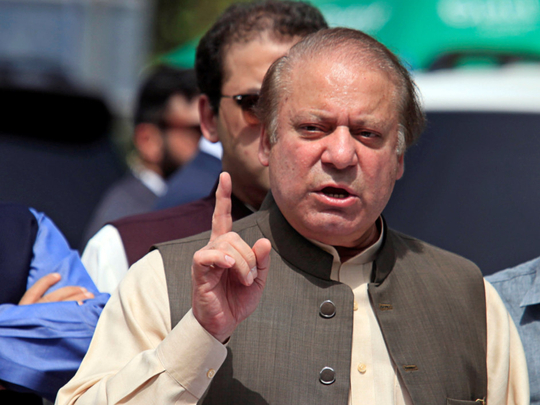
When Pakistan Prime Minister Nawaz Sharif on Thursday appeared before a high-powered team of government investigators to probe the source of large-scale offshore wealth belonging to his three children, many from his Pakistan Muslim League — Nawaz (PML-N) were quick to proclaim the moment as a milestone in the country’s political history. Sharif’s backers celebrated the day, marking the first time ever that the head of an elected government had appeared before an investigating body to answer queries related to the case.
Specifically, Sharif’s children are confronted with a Supreme Court-led inquiry into the source of their funds, which eventually allowed the purchase of some of the world’s most expensive real estate properties in the form of luxurious apartments in central London. The case was triggered by circumstances well beyond Pakistan, through the so called ‘Panama leaks’ — a set of documents leaked by an independent group with detailed information on wealth stashed away in offshore accounts in Panama.
Increasingly, the probe has sharpened the political divide in Pakistan, with Sharif’s backers making him appear as effectively a persecuted party. His opponents, led by former cricket star-turned politician, Imran Khan, continue to vociferously seek Sharif’s removal as the Prime Minister.
The persecution bit needs a more aggressive analysis. Though Sharif may be the first Prime Minister who has faced such a panel of investigators, while in office, he is certainly not the first politician in Pakistan’s checkered history to face the wrath of instruments of the state. The case of the late prime minister Zulfiqar Ali Bhutto, hanged in 1979 on charges of ordering the assassination of a political foe, to this day is remembered as the target of a controversial case with allegations that the charges were all trumped up. Meanwhile, two of Pakistan’s elected prime ministers — Liaquat Ali Khan and Benazir Bhutto — were both assassinated under circumstances that remain a mystery until this day. And following Pakistan’s return to democracy in 2008, former prime minister Yousuf Raza Gilani was removed under orders from the Supreme Court.
It is clear that the case against Sharif is far too serious to be treated just as a matter of persecution against an elected leader. For far too long, Pakistan’s politicians have claimed to be persecuted whenever confronted with matters of wrong-doing.
In Sharif’s case, the issue at hand is indeed a very powerful reminder of the ways in which Pakistan still needs to evolve democratically, notwithstanding the recurring practice of holding elections to choose one civilian government after another. Without predicting the eventual outcome of this episode, its important to remember two equally vital aspects of the case.
On the one hand, there have been far worse examples of persecution in Pakistan than a prime minister’s appearance before the investigating panel. In fact, turning this into a matter of persecution will simply divert attention from the matter at hand, which is to oversee a comprehensive investigation in the case itself.
On the other hand, there must be scope for celebrating Pakistan’s coming of age. For years, the difference between Pakistan’s evolution and that of more established and mature democracies was simply just one. In sharp contrast to cases of politicians elsewhere, who were forced to pay the price on matters of controversy, Pakistan’s politicians many a time have simply gone scot free.
In the case of the ‘Panama leaks’ too, examples such as that of the former prime minister of Iceland who stepped down when faced with revelations of offshore wealth, are much too compelling to be ignored. Even then, if a Pakistani prime minister is finally presenting himself for answering questions related to ‘Panama leaks’, then that in itself must be seen as a step forward in the country’s democratic evolution.
This ongoing process comes just a year before elections are due in 2018 for a new parliament. Its vital that the polls are preceded by a tougher set of standards for contestants than seen before. A more rigorous criteria for screening of candidates for the upcoming transition is indeed essential in the interest of promoting Pakistan’s democratic development.
Once the exercise begins, the bar needs to be raised for candidates going down to the grass roots. At the same time, Pakistan’s increasingly robust media must be seen as an empowering tool for social development and consolidation of the country’s democracy. In the run-up to Sharif’s appearance on Thursday, his supporters vocally discredited the decision by the investigators to summon the prime minister. Clearly, they missed the point.
In any modern-day, stable democracy, no one, including the top elected leaders, is above the law. Sharif’s appearance before the inquiry panel, therefore, must be seen as routine rather than a break from the ordinary.
And last but not the least, the Supreme Court’s investigations are essential in the broader interest of Pakistan where anecdotal evidence clearly suggests a widespread presence of an undocumented economy. This being the case, it is not surprising that many affluent Pakistanis will be tempted to park their wealth outside the country. The mere fact that less than one per cent of Pakistan’s population pays income tax, clearly suggests the likely cases of tax evasion. For years, repeated claims by many members of parliament that they are outside the income tax net, also suggest the extent to which a tough clampdown on tax evasion will likely remain a distant dream.
For Pakistan’s future survival as a modern, secure and economically thriving state, it is essential to use the Supreme Court’s proceedings for making a new beginning. And the case remains far from a source of pressure on Sharif.
Farhan Bokhari is a Pakistan-based commentator who writes on political and economic matters.











